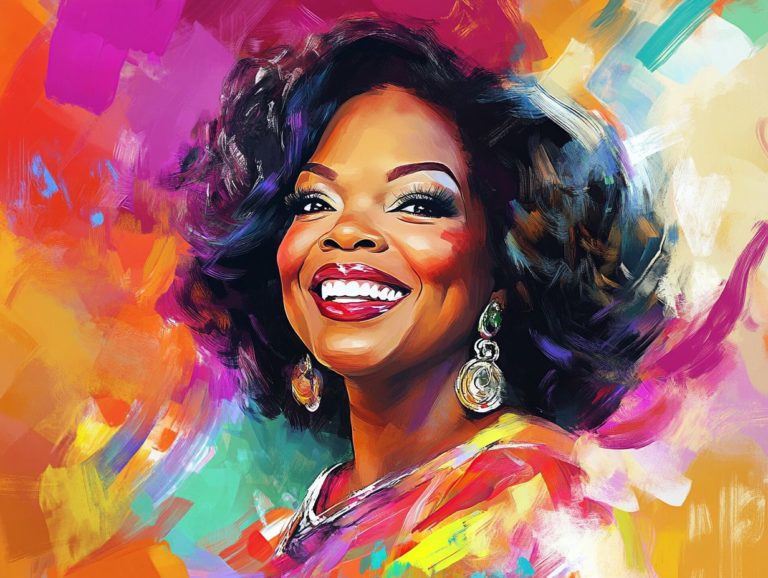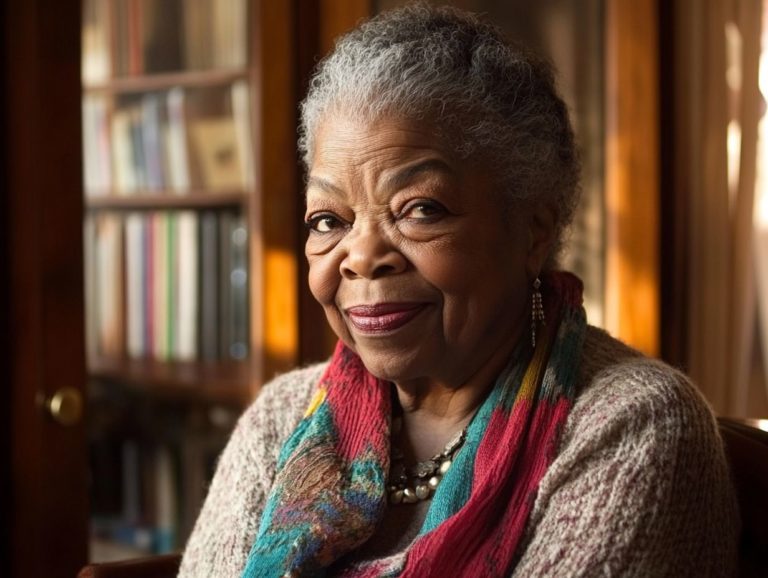The Life and Legacy of Martin Luther King Jr.
Martin Luther King Jr. stands as a monumental figure in the pursuit of civil rights and social justice.
This overview invites you to explore his formative years and the influences that shaped his groundbreaking philosophy. Key moments, such as the Montgomery Bus Boycott, the Birmingham Campaign, and the iconic March on Washington, show how he shaped the movement.
Delve into King s enduring legacy, examining his profound impact on civil rights legislation and how he continues to inspire activists today.
Join us in exploring the incredible journey of a true visionary, inviting reflection on the lasting significance of his vision.
Contents
- Key Takeaways:
- The Early Life of Martin Luther King Jr.
- Key Moments in the Civil Rights Movement
- The Legacy of Martin Luther King Jr.
- Frequently Asked Questions
- What is the significance of Martin Luther King Jr.’s life and legacy?
- What were some of Martin Luther King Jr.’s major accomplishments?
- How did Martin Luther King Jr. become a leader in the Civil Rights Movement?
- What were some of the key events in Martin Luther King Jr.’s life?
- How did Martin Luther King Jr.’s legacy impact the world?
- What lessons can we learn from Martin Luther King Jr.’s life and legacy?
Key Takeaways:
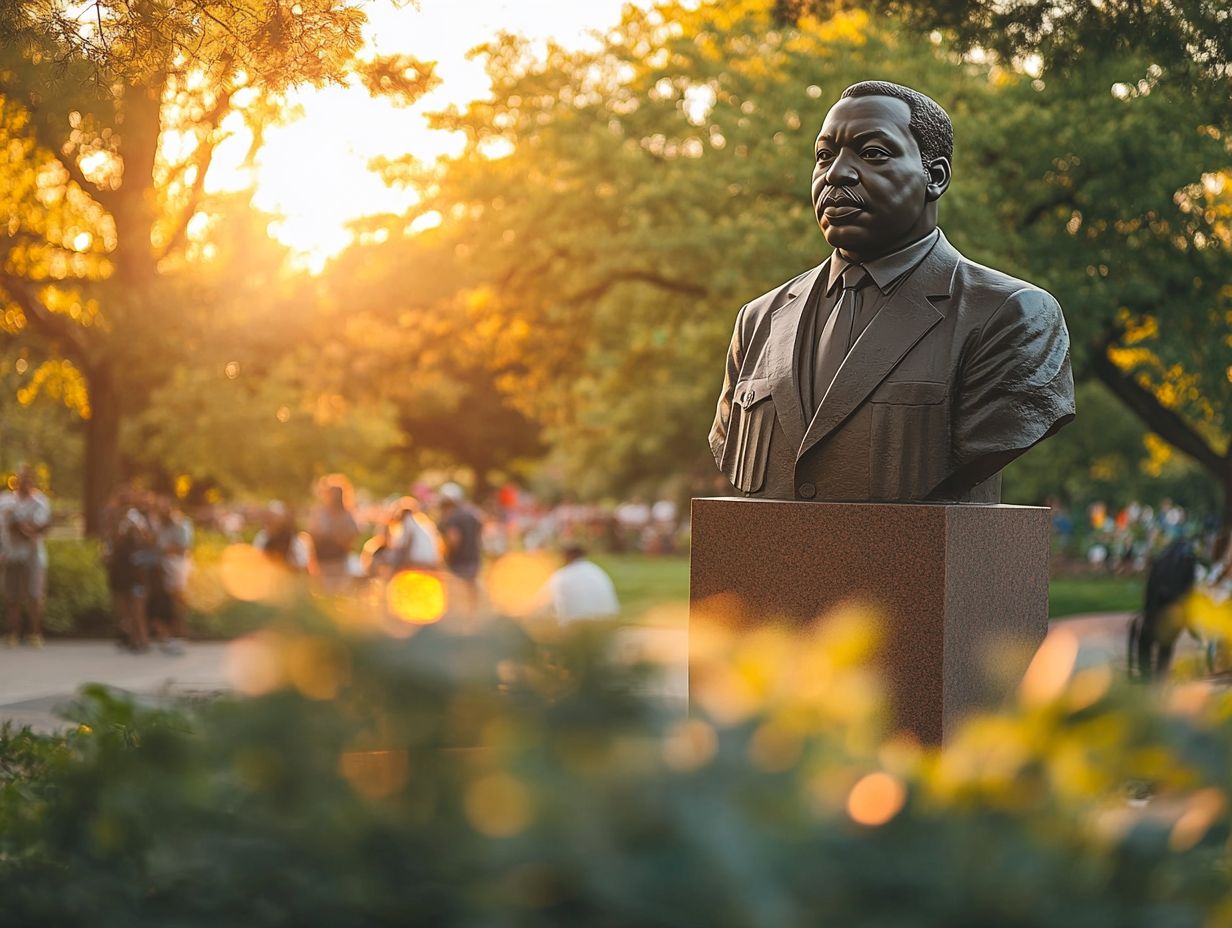
- Discover how Martin Luther King Jr.’s early life laid the foundation for his activism.
- Learn how pivotal events like the Montgomery Bus Boycott advanced the fight for equality.
- Understand the lasting effects of King s legacy on today s civil rights movements.
The Early Life of Martin Luther King Jr.
Martin Luther King Jr. was born on January 15, 1929, in Atlanta, Georgia, into a family deeply embedded in the African American community. Here, the values of social justice and equality were strongly taught.
Your understanding of his aspirations begins at Morehouse College, where he embraced the Christian ideals that would later shape his pivotal role in the civil rights movement.
King s upbringing, guided by his father, a Baptist minister, and his mother, a gifted musician, laid the groundwork for his powerful advocacy for human rights.
Early Influences and Education
The education and early influences in Martin Luther King Jr.‘s life were crucial in shaping him into a leader of the civil rights movement. From a young age, the foundational teachings from his parents instilled in him a profound sense of justice and moral responsibility.
His father, a prominent pastor, and his mother, a dedicated educator, both underscored the importance of faith and integrity. King’s formal education at Morehouse College and later at Crozer Theological Seminary expanded his worldview and connected him with influential mentors.
Figures like Benjamin Mays, an essential educator and civil rights advocate, challenged him to think critically about the societal injustices around him. These relationships and his academic pursuits nurtured his deep commitment to social justice, steering him toward peaceful protests and actions as a powerful means of enacting change.
Key Moments in the Civil Rights Movement
Key moments in the civil rights movement resonate with the profound oratory of Martin Luther King Jr. and his steadfast dedication to racial equality.
Events like the Montgomery Bus Boycott, the Birmingham Campaign, and the March on Washington stand as significant milestones in this relentless pursuit of justice, shaping the narrative of a transformative era.
Montgomery Bus Boycott
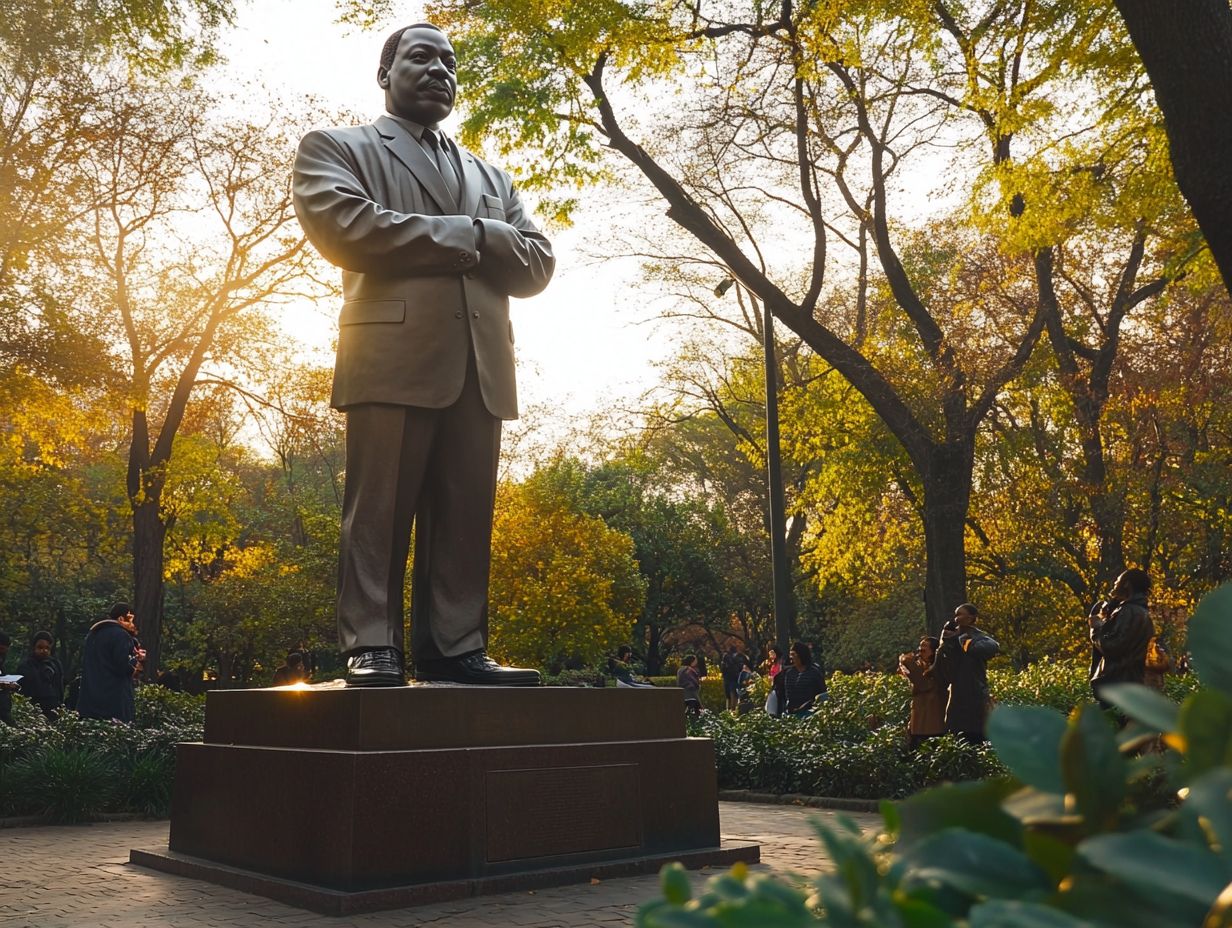
The Montgomery Bus Boycott stands as a pivotal chapter in the civil rights movement. It was sparked by Rosa Parks’ fearless decision to refuse her bus seat. This act of defiance ignited a year-long protest, skillfully led by Martin Luther King Jr. and other community leaders advocating for the end of racial segregation.
To understand the origins of this significant moment, one must consider the widespread unfair treatment that African Americans faced in Montgomery, Alabama. Discriminatory laws relegated them to a marginalized existence, severely limiting their rights.
Key figures such as E.D. Nixon and Jo Ann Robinson were instrumental in organizing the boycott. They called for a complete cessation of the bus system. To maintain the peaceful nature of their protest, the community ingeniously developed carpool systems and organized walking groups. This showcased remarkable resilience in the face of adversity.
They also rallied support from local organizations, uniting to challenge the status quo. Their efforts not only sparked change within their own community but also inspired similar movements nationwide. This was a turning point for justice in the pursuit of civil rights.
Birmingham Campaign
The Birmingham Campaign, led by Martin Luther King Jr., stands as a pivotal chapter in the civil rights movement. It targeted racial injustice and segregation in one of America’s most divided cities.
This initiative was designed not just to confront local discriminatory practices. It also aimed to cast a spotlight on the systemic oppression faced by African Americans. Nonviolent protest tactics, like marches and sit-ins, played a crucial role, engaging the community and demonstrating the unwavering spirit of those striving for equality.
A key component of this movement was King s ‘Letter from a Birmingham Jail’. In it, he addressed critics who deemed the demonstrations as ill-timed, powerfully expressing the moral imperative for direct action. The significant public pressure generated by these efforts ultimately swayed legislation, shifting the national dialogue toward civil rights progress and compelling lawmakers to tackle injustices directly.
March on Washington
The March on Washington for Jobs and Freedom is undeniably one of the most significant milestones in the civil rights movement. Here, Martin Luther King Jr. delivered his legendary ‘I Have a Dream‘ speech, a clarion call for justice and equality for African Americans.
This monumental rally, held on August 28, 1963, was more than just a gathering. It was a vibrant coalition of activists from diverse racial and socioeconomic backgrounds, all standing together to advocate for civil rights, economic empowerment, and the abolition of racial segregation.
Featuring prominent leaders from various organizations including labor unions, religious groups, and student associations the event underscored the urgent need for change. King’s words had a powerful impact, inspiring those who were present and reverberating across the nation. They shaped public opinion and altered the course of the civil rights movement.
His vision of a future marked by racial harmony continues to serve as a guiding light in the ongoing quest for equality today.
The Legacy of Martin Luther King Jr.
The legacy of Martin Luther King Jr. is intricately woven into the fabric of American history. His inspirational leadership and unwavering commitment to equality laid the groundwork for transformative civil rights legislation. This ignited a passion for justice that continues to inspire countless activists dedicated to social change today.
Impact on Civil Rights Legislation
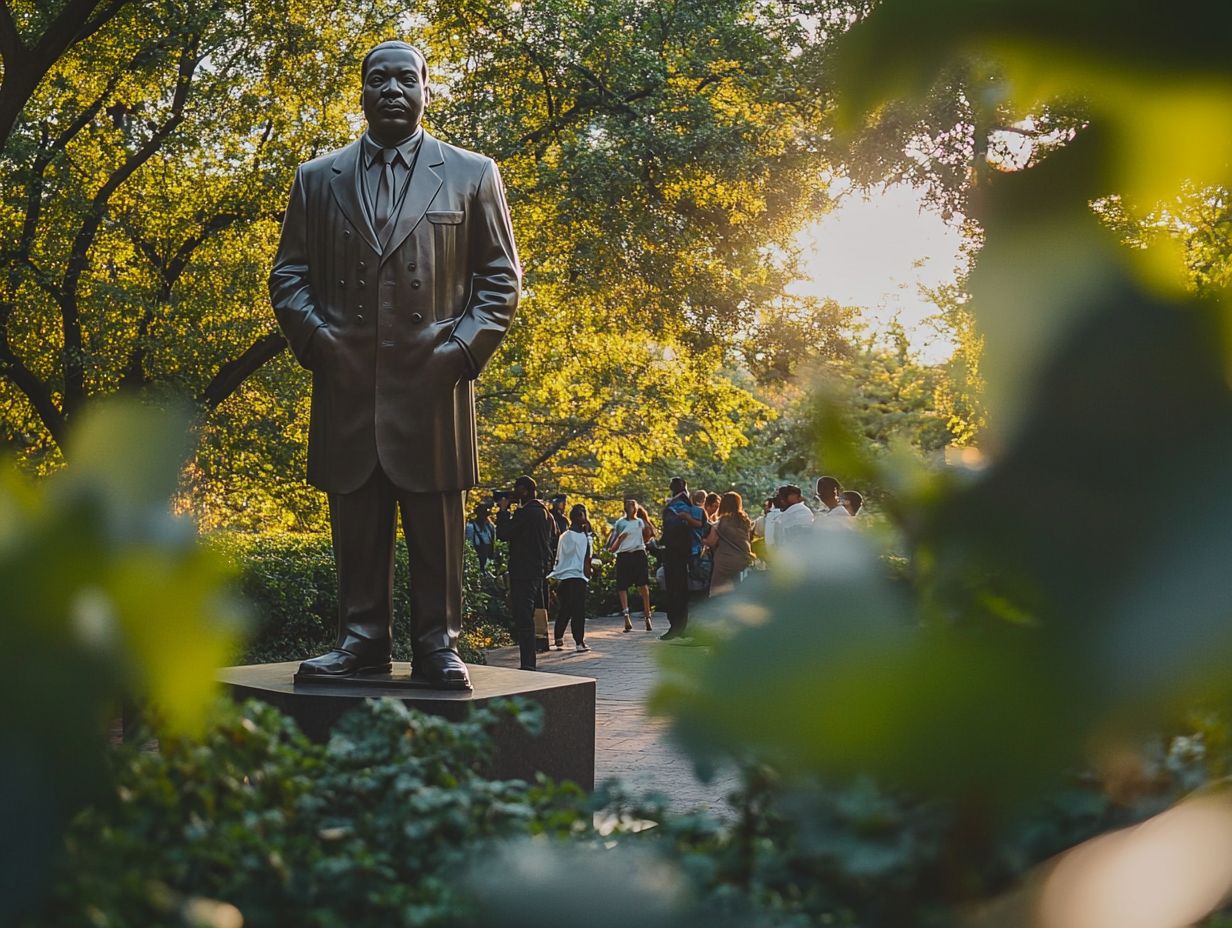
The impact of Martin Luther King Jr. on civil rights legislation is undeniably profound. Your understanding of this historical figure reveals how instrumental his efforts were in the passage of landmark laws designed to dismantle racial segregation and promote equality.
His tireless advocacy didn’t just stir public sentiment; it also provided a moral framework that legislators found impossible to overlook. The Civil Rights Act of 1964, which outlawed discrimination based on race, color, religion, sex, or national origin, was a direct outcome of his leadership. The Voting Rights Act of 1965, aimed at eliminating barriers to voting for African Americans, also resulted from his efforts.
These pieces of legislation represent significant milestones in the national quest for social justice, illustrating how working together and strong speeches can catalyze transformative change in society.
Inspiring Future Activists
Martin Luther King Jr.’s life and work continue to inspire you and fellow activists who are determined to challenge racism and champion social change within your communities. His principles of nonviolence the practice of peaceful resistance and civil disobedience the refusal to obey unjust laws serve as foundational pillars for modern grassroots movements, empowering you to mobilize for change without resorting to aggression.
You draw upon his teachings to organize protests, engage in community outreach, and lead advocacy initiatives that emphasize unity and collective action. Consider the Black Lives Matter movement, which resonates with King s vision by advocating for justice and equality, amplifying the voices that demand systemic reform.
Similarly, climate justice advocates employ nonviolent methods reminiscent of King s approach to shed light on environmental issues that disproportionately affect marginalized communities, underscoring the timeless relevance of his methodologies in today s quest for social equity. King’s impact doesn’t just end with activism; it continues to inspire us today.
Continuing Relevance and Commemoration
The ongoing relevance of Martin Luther King Jr.’s message is honored each year on Martin Luther King Jr. Day, serving as a poignant reminder of his invaluable contributions to the pursuit of peace and justice.
This day is more than just a holiday; it calls you to action, inspiring both individuals and communities to engage in meaningful acts of service that embody King s vision for a more equitable society. Local organizations urgently coordinate community service projects, giving you the opportunity to partake in neighborhood improvements, food drives, and educational initiatives that celebrate the legacy of nonviolence and empathy.
Many educational resources are available, ensuring that his teachings resonate with younger generations. In the current landscape of social justice movements, his principles guide us, motivating activists like you to persist in the fight against inequality and discrimination in all its forms.
Frequently Asked Questions
What is the significance of Martin Luther King Jr.’s life and legacy?
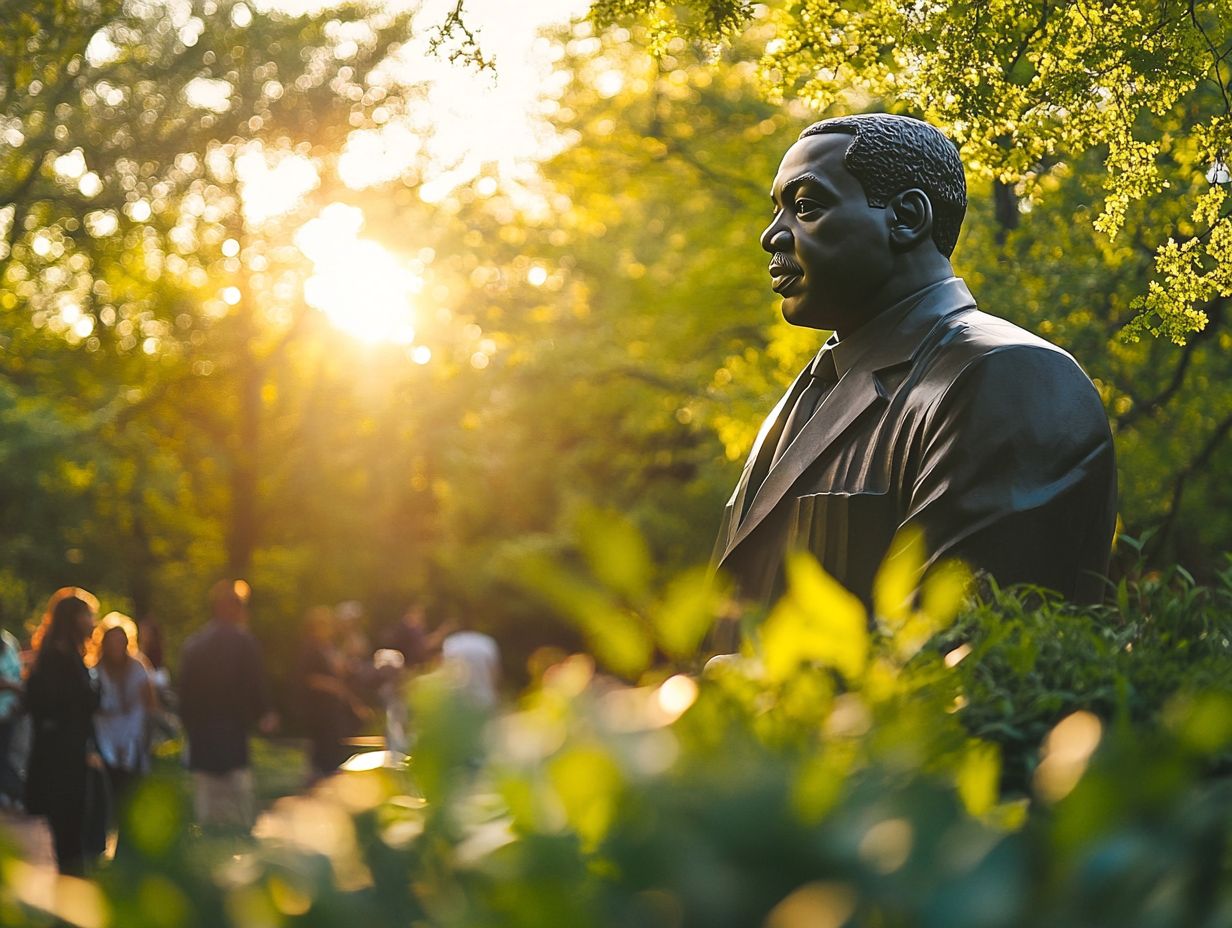
Martin Luther King Jr. dedicated his life to fighting for civil rights and social justice, making him one of the most important figures in American history. His legacy continues to inspire and influence people around the world.
What were some of Martin Luther King Jr.’s major accomplishments?
Some of Martin Luther King Jr.’s major accomplishments include leading the Montgomery Bus Boycott, delivering the iconic “I Have a Dream” speech, and helping to organize the historic March on Washington.
How did Martin Luther King Jr. become a leader in the Civil Rights Movement?
Martin Luther King Jr. rose to prominence as a leader in the Civil Rights Movement through his powerful oratory skills, nonviolent approach to activism, and unwavering commitment to equality and justice for all individuals.
What were some of the key events in Martin Luther King Jr.’s life?
Some key events in Martin Luther King Jr.’s life include his involvement in the Montgomery Bus Boycott, the formation of the Southern Christian Leadership Conference, and his famous “Letter from Birmingham Jail.”
How did Martin Luther King Jr.’s legacy impact the world?
Martin Luther King Jr.’s legacy has impacted the world in profound ways. His teachings inspired many to fight against injustice and pursue equality.
What lessons can we learn from Martin Luther King Jr.’s life and legacy?
We learn about the strength of peaceful protest and the importance of standing up for what is right. One person’s actions can truly change the world.



